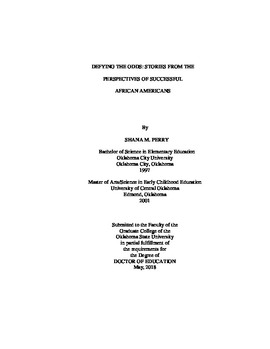| dc.description.abstract | The purpose of this qualitative case study is to gain a better understanding of the lived experiences of six successful African Americans who achieved success despite growing up in high poverty situations in an effort to gain a more encompassing, realistic, and intimate understanding of how and why they were able to overcome dismal circumstances associated with poverty. These individuals attained academic learning, success, and achievement after graduating from a Midwestern state's low socioeconomic urban public high school, completed a bachelor's degree, a master's degree when required, and finally a doctorate, resulting in a better quality of life. The desire is to gain a deeper, richer, more insightful understanding of the factors which led to their academic success. Nora's Student Engagement Model (2002, 2003, 2006) will serve as a lens to view the themes of the African Americans who experienced academic success in the face of the odds stacked against them. Nora's Student Engagement Model (2002, 2003, 2006) was selected as the lens to view this research because it includes the factors that influence student retention prior to enrolling and attending college. The intent of the model is to identify specific latent constructs that have an impact on the decision of undergraduate students to drop out of college or to persist and remain in college. Findings revealed numerous commonalities, but the emergent themes were shared through the sub-questions that provided a better structure to share the findings. Narrative language amplified the voices of the participants that would have otherwise remained silent (Glesne, 1999). Finally, the researcher provides implications for theory, practice and suggests recommendations for additional research to add to the existing body of knowledge. Overall, the African American outliers in this study demonstrated Frankl's (1992) point that, "human potential at its best" can "transform personal tragedy into a triumph" and "turn one's predicament into a human achievement." (p.116) | |
